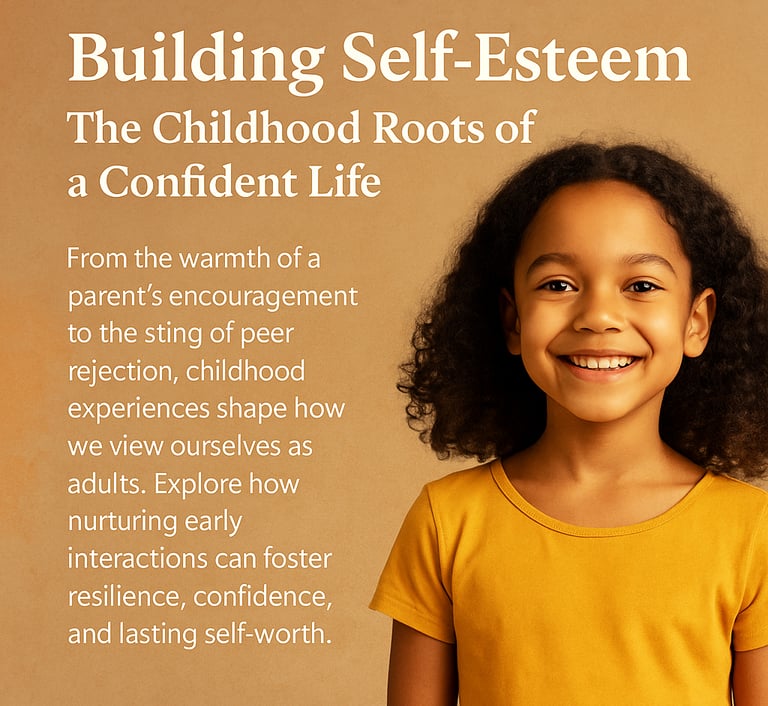Rooted in Confidence: How Childhood Experiences Build—or Break—Self-Esteem for Life
Self-esteem isn’t something we’re born with—it’s something we grow into. The way a child is seen, heard, and supported shapes their lifelong sense of self. From family dynamics to school feedback, these everyday interactions form a powerful blueprint for confidence and resilience. This blog explores how childhood experiences influence self-esteem, the lasting impact they have into adulthood, and how tools like the Locus Therapy App can help children build a strong emotional foundation.


Building a Strong Foundation: How Childhood Experiences Shape Self-Esteem for Life
Self-esteem is not an inborn trait—it is a product of experience, carefully shaped by the emotional, social, and environmental context in which a child grows. Every smile of encouragement, every scolding word, and every moment of neglect forms a lasting impression. These impressions build the emotional scaffolding that underpins our sense of identity and self-worth. In adulthood, these echoes often resurface, influencing our confidence, how we build relationships, how resilient we are in the face of adversity, and whether we pursue our full potential. Understanding how early life shapes self-esteem allows us to foster emotional well-being and interrupt negative cycles for the next generation.
Understanding Self-Esteem: What It Is and Why It Matters
Self-esteem is the internal compass that helps us understand our value. It governs how we perceive ourselves, the expectations we set, how we treat ourselves, and what we believe we deserve from others. Individuals with high self-esteem are more resilient, confident, and equipped to embrace opportunities and overcome setbacks. They are more likely to take initiative, seek support when needed, and navigate challenges without being overwhelmed by self-doubt.
In contrast, low self-esteem can manifest as chronic self-criticism, social withdrawal, fear of failure, and heightened sensitivity to rejection. It often contributes to anxiety, depression, and low motivation. Given its powerful influence on mental health and life outcomes, understanding how self-esteem forms—and how we can support its healthy development—is essential for parents, educators, and healthcare professionals alike.
Childhood: The Foundation of Self-Esteem
Early childhood is a time of rapid psychological development. During these formative years, children develop core beliefs about themselves and their place in the world. They learn through interactions: a parent’s gentle reassurance during a tantrum, a teacher’s praise for effort, or a peer’s unkind comment. These experiences accumulate into an internal narrative: "Am I good enough? Do I belong? Am I safe to be myself?"
Research has shown that consistent, positive interactions in early life are strong predictors of healthy self-esteem in adolescence and adulthood. Conversely, chronic exposure to neglect, harsh criticism, or emotional instability can distort a child’s self-image and impact emotional development.
Key Childhood Influences on Self-Esteem
1. Parental Connection: Children who grow up with consistent, loving, and responsive parents are more likely to develop a secure sense of self. A child who feels seen, heard, and valued learns to internalize those messages.
2. Constructive Encouragement: When children are acknowledged for their efforts rather than only their outcomes, they begin to associate self-worth with perseverance and growth, not perfection.
3. Fair and Empathetic Discipline: Discipline that focuses on correcting behavior—not shaming the child—helps preserve dignity while guiding development.
4. Positive Peer Relationships: Friendships and peer validation foster a sense of belonging and social confidence. On the flip side, bullying or exclusion can severely damage a child's self-image.
5. Academic and Activity Success: Opportunities for achievement—whether in school, sports, or creative pursuits—reinforce a child’s belief in their own capabilities and strengths.
The Role of Parenting Styles
Parenting style greatly influences the self-perception of a child:
· Authoritative parenting—a balanced approach of warmth and structure—tends to produce children with high self-esteem. These children feel safe to explore, make mistakes, and grow.
· Authoritarian parenting, with its focus on control and obedience, may lead to compliance, but often at the expense of self-confidence and independence.
· Permissive parenting, marked by indulgence and lack of limits, may leave children feeling insecure and unsure of boundaries.
· Neglectful parenting, where emotional support and guidance are absent, is associated with the most detrimental effects, including a deep-rooted sense of unworthiness.
Understanding the impact of these styles empowers caregivers to be intentional in creating emotionally supportive homes.
The School Environment: A Mirror of Self-Worth
School is a central setting for the development of identity and self-esteem. Teachers and educational systems that foster belonging, inclusivity, and recognition can significantly boost a child’s confidence.
Teachers who acknowledge progress, provide encouragement, and manage classrooms with empathy often help students internalize positive beliefs about themselves. On the other hand, punitive or dismissive environments can cause shame and self-doubt, especially in children who may already struggle with self-esteem.
Peer dynamics at school also play a critical role. Belonging to a friend group, feeling included, and avoiding bullying are key protective factors in self-esteem development.
When Trauma Shapes Self-Perception
Childhood trauma—whether due to neglect, abuse, loss, or instability—can severely undermine a child’s self-worth. Traumatized children often internalize false beliefs about their own unworthiness or "badness."
This psychological impact is not fleeting. Without intervention, it can lead to long-term mental health struggles and a deeply distorted self-image. Recognizing trauma early, offering emotional safety, and providing professional support are critical steps in restoring a child’s sense of value.
Therapists, parents, and educators all play roles in this healing process. Through compassion, consistency, and connection, it’s possible to help children reshape their internal narratives and rebuild lost trust in themselves and others.
Building Healthy Self-Esteem: Practical Strategies
To support self-esteem development, parents and caregivers can adopt the following strategies:
· Offer Unconditional Love: Make it clear that a child is loved for who they are—not just what they do.
· Celebrate Effort, Not Just Results: Praising effort encourages persistence, resilience, and intrinsic motivation.
· Create Space for Emotional Expression: Children need safe outlets to process emotions without judgment.
· Model Positive Self-Talk: Children often adopt the inner dialogue of their caregivers. Speak kindly about yourself.
· Encourage Autonomy: Allow children to make decisions appropriate to their age, helping them develop confidence and decision-making skills.
· Address Mistakes With Compassion: Reframe errors as learning opportunities rather than failures.
· Support Interests and Strengths: Validating what makes each child unique helps them feel appreciated and seen.
The Long-Term Impact of Childhood Self-Esteem
A child who grows up believing they are capable, worthy, and loved is more likely to carry those beliefs into adulthood. Healthy self-esteem promotes:
· Emotional resilience
· Fulfilling relationships
· Academic and career success
· Lower risk of mental health challenges
· Greater life satisfaction
Conversely, low self-esteem may manifest in:
· Difficulty forming healthy relationships
· Increased vulnerability to stress, anxiety, and depression
· Reduced motivation and fear of taking risks
· A persistent inner critic that sabotages progress
Investing in children’s self-esteem today is a proactive way to ensure a healthier, more emotionally grounded future.
Where Locus Therapy App Fits In
What happens when a child faces neurodivergent challenges like dyspraxia, sensory issues, or difficulty with regulation—and traditional support systems fall short?
The Locus Therapy App was designed to address that gap. Developed by a multidisciplinary team of occupational therapists, educators, and parents, Locus provides families with timely, evidence-based guidance when they need it most.
· 📱 Screening Tools: Quickly assess your child’s strengths and support needs
· 🧠 Therapy Programs: Access daily activities to build motor skills, attention, emotional regulation, and more
· 🧾 Printable Resources: Use at home, school, or in therapy settings
· 💬 Parent Guidance: Feel supported and informed every step of the way
By reinforcing consistent effort, celebrating small wins, and encouraging positive self-talk, Locus helps lay the very foundation of self-esteem. It supports not just skills development—but emotional growth and confidence.
Because therapy isn’t just about tasks. It’s about giving every child the belief: "I can."
🔗 Learn more at www.locustherapy.ie
Conclusion: A Responsibility We Share
Building self-esteem is not the responsibility of children—it is the responsibility of those who care for them. Whether you are a parent, teacher, therapist, or community member, your words, actions, and presence shape how children see themselves.
When we respond with empathy, set healthy boundaries, and encourage authenticity, we plant seeds of confidence. When we model resilience, process mistakes with grace, and celebrate growth over perfection, we show children they are enough—just as they are.
Let’s build that strong foundation—together.
